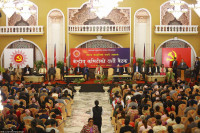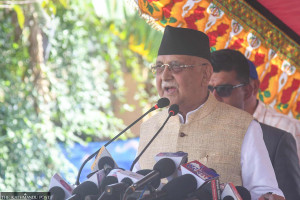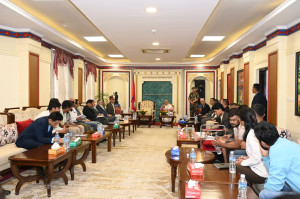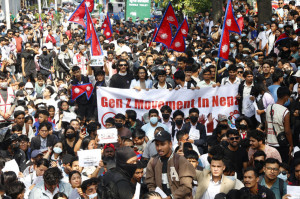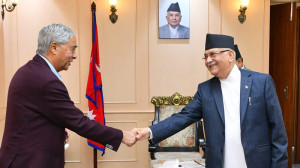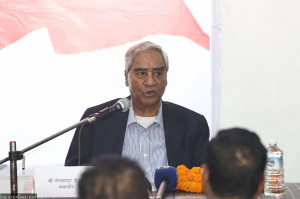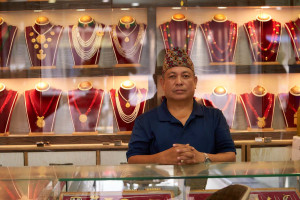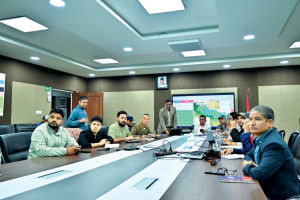Politics
Hamal’s induction into Cabinet gives legal professionals a shock
More than 70 lawyers demand sack for controversial Supreme Court justices.
Tika R Pradhan
Prime Minister Sher Bahadur Deuba appointed Gajendra Bahadur Hamal, a brother-in-law of Chief Justice Cholendra Shumsher Rana, minister for Industry, Commerce and Supplies on Friday.
Leaders of the ruling coalition including Chairman of the CPN (Maoist Centre) Pushpa Kamal Dahal have been clarifying that Hamal was appointed on the Nepali Congress’ quota and there was nothing to be suspicious about him.
However, no one believes what the leaders of the political parties are saying.
After Hamal’s name was revealed by the President’s Office on Friday more than five dozen legal professionals including senior advocates and former and incumbent office bearers of the Nepal Bar Association and Supreme Court Bar Association along with chairs and secretaries of the Bar units of Kathmandu Valley and Kavrepalanchok district held a serious discussion on the new development.
The gathering of the Legal Practitioners Pressure Group for Judicial Reform—a loose association of lawyers—has issued an ultimatum to the Nepal Bar Association to either fulfil their demands or devise a plan for a struggle against the existing leadership of the Judiciary within November 1.
“During the meeting, former general secretary of the Nepal Bar Association Raman Shrestha warned the current leadership of the Association that a parallel committee will be formed to launch a struggle if the Association did not heed their demands,” said Tika Ram Bhattarai, an advocate who was present at the gathering. “A memorandum was handed over to the chair of NBA at the gathering where more than 70 lawyers including many senior advocates were present.”
He said all the lawyers had the same voice that the legal fraternity must struggle against the existing leadership to protect the dignity of the judiciary for which the Nepal Bar Association should take the lead.
One of the major decisions of the crucial gathering was that the induction of Chief Justice Cholendra Shumsher Rana’s relative into the Cabinet was objectionable and controversial Supreme Court justices must be relieved of their duties through a review process.
“We cannot tolerate this anymore,” said Raman Shrestha, a senior advocate. “If Nepal Bar Association failed to come up with a strategy for a struggle, a parallel committee will take the lead.”
Shrestha, who was the attorney general when CPN (Maoist Centre) chair Dahal was prime minister, said the lawyers could go to the extent of boycotting the bench of controversial justices of the Supreme Court besides working with black bands around their heads.
The legal fraternity has taken the appointment of a district-level leader of the ruling Nepali Congress Hamal, whom the government claims was inducted on Congress quota, very seriously as he is not a member of the Federal Parliament.
Now, the struggle of the lawyers is likely to gather momentum once the officials of the courts return from a 15-day Dashain festival holiday. The Supreme Court has also been criticized for observing long holidays during the Hindu festival when most of the government offices are closed for just five days for Dashain.
Now, the leadership of the judiciary will have a tough time because Chief Justice Rana, who had already courted controversy on various issues including his failure to move ahead the Constitutional Bench to finalize petitions against the appointments in constitutional bodies, with Hamal’s induction into Deuba’s Council of Ministers on Friday.
“Who will believe that Hamal, a close relative of Rana’s, was appointed on Congress quota?” asked Shrestha. “There were media reports that he got a significant chunk in the 52 appointments to the constitutional bodies and everyone believes that.”
Ramesh Badal, who served as attorney general when UML Chair KP Sharma Oli was prime minister, said it was common for the member of the Constitutional Council including the Speaker, Deputy Speaker, Chairman of National Assembly and Opposition leader to demand their shares in appointments in constitutional bodies but demanding share in the executive cannot be tolerated.
“We are in wait-and-see mode,” Badal told the Post. “We believe that not only the Chief Justice but also the justices who were in the Constitutional Bench were biased,” Badal said.
Given a series of controversies, the judiciary has long been questioned for failing to maintain its independence and is gradually losing faith of the public which was even revealed by the internal report of the Supreme Court prepared by Justice Hari Krishna Karki.
But the appointment of Hamal, whom even the Nepali Congress leaders believe was Chief Justice Rana’s choice, has taken the brewing discontent among the legal fraternity to a new height.
However, former Chief Justice Anup Raj Sharma said the judiciary has reached to the most critical phase in its history now though it is one of the oldest institutions giving continuity to its presence.
“Reviewing the decisions of the justices could be one option to bringing reforms to the judiciary but there must be a fair and acceptable mechanism and criteria and with the chief justice himself in controversy it will be difficult for him to devise such a mechanism,” Sharma said. “The issues floated by the lawyers may not get recognition unless there is a huge pressure to adopt it.”
Sharma, who had also led the National Human Rights Commission, said former justices ‘with clean image’ could review at least 30 cases decided by the existing justices and give their verdicts.
The Judicial Council has been envisioned by the Constitution to nominate justices and punish them if they commit mistakes but the Council remains largely defunct when it comes to punishing such justices. The Karki-led panel had pointed out that corruption begins with the appointment of justices.




 18.12°C Kathmandu
18.12°C Kathmandu
